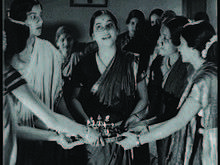Kunku
Kunku (Marathi title)[1][2] is a 1937 Marathi classic social drama film directed by V. Shantaram, and based on the novel, Na Patnari Goshta by Narayan Hari Apte, who also wrote film's screenplay.[3] The film was simultaneously shot and released in Hindi as Duniya Na Maane.
| Kunku | |
|---|---|
_1937.jpg) | |
| Directed by | V. Shantaram Rajaram Vankudre Shantaram |
| Produced by | Prabhat Film Company |
| Written by | Narayan Hari Apte (novel & screenplay) Munshi Aziz (dialogue) |
| Starring | Shanta Apte, Keshavrao Date, Raja Nene, Vimala Vasishta, Shakuntala Paranjpye, Master Chhotu |
| Music by | Keshavrao Bhole |
| Cinematography | V. Avadhoot |
Release date |
|
Running time | 154 minutes |
| Country | British Raj |
| Language | Marathi/Hindi |
The movie went on to become both a critical and commercial success, and was shown at the Venice International Film Festival.[2] The film is now hailed for "its daring attack on the treatment of women in Indian society." and depiction of child marriage.[4]
For film's lead actress, Shanta Apte, it was third most memorable performance in a row, after V.Shantaram's previous classics, Amrit Manthan (1934) and Amar Jyoti (1936). Besides other songs, she also sang a full-fledged English song in the film: "A Psalm of Life", written by Henry Wadsworth Longfellow (1807–1882).[5][6][7]
Plot
The basic storyline revolves around a young woman, Nirmala (Shanta Apte) rebelling against her marriage to a much older widower, Kaka Saheb (Keshavrao Date), as was the practice in those days. The story is based on a novel by Shri. Narayan Hari Apte. It reminds us instinctively of the story of Sharada, a play by Deval which had long been a classic of Marathi theatre. Neera, a young girl, is married off to an old widower by her foster-parents, an uncle and his orthodox wife. The deal is obviously motivated by considerations of money. The shock of the marriage is too much for the girl, but she bravely tries to accommodate herself in the house. The widower deceives himself into believing that he is still not old enough to have lost his manhood. His college-going son tries to flirt with his young stepmother, while a widowed daughter of his sympathises with her in her woe. The marriage does not work. Some cheer is added to Neera's life through the company of a teenage girl belonging to the household. However, when the old man fully realises the implications of his action, he commits suicide, leaving the girl he has married against her will to go her own way.
Music
The songs are from the lead actress Shanta Apte even sung. Shantaram Athavale wrote the lyrics to the music of Keshavrao Bhole. The English text of the song in the world's broad field of battle ... Be not like dumb, driven cattle is a poem by Henry Wadsworth Longfellow.
Cast

- Shanta Apte as Nirmala
- K. Date as Kakasaheb
- Raja Nene as Jugat
- Vimala Vasishta as the Aunt
- Shakuntala Paranjpye as Sushila
- Master Chhotu
Shanta Apte ... Nirmala Keshavrao Date Keshavrao Date ... Keshavlal Pleader Vimala Vasishta Vimala Vasishta ... Chachi (as Vimalabai Vasistha) Shakuntala Paranjpye Shakuntala Paranjpye ... Sushila Vasanti Vasanti ... Shanta Raja Nene Raja Nene ... Jugal Gauri Gauri ... Mami Chhotu Chhotu ... Mama Rest of cast listed alphabetically: Karmarkar Karmarkar
References
- Armes, Roy (1987). Third World film making and the West. University of California Press. p. 112. ISBN 0-520-05690-6.
- Films Prabhat Film Company.
- Duniya Na Mane National Film Archive of India
- India's Art House Cinema Archived 22 November 2009 at the Wayback Machine by Lalit Mohan Joshi, British Film Institute.
- "'Hinglish' Song". Archived from the original on 15 October 2008. Retrieved 22 August 2008.
- 'A Psalm of Life' text
- Duniya Na Mane-In The World's (Longfellow poem by Shanta Apte) on YouTube
- Ashish Rajadhyaksha, Paul Willemen: Encyclopedia of Indian Cinema, S. 272
- http://www.answers.com/topic/kunku
External links
| Wikimedia Commons has media related to Kunku (1937). |